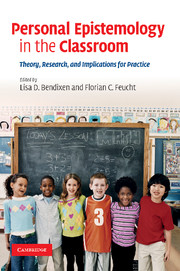Book contents
- Frontmatter
- Contents
- List of figures
- List of tables
- Contributors
- Part I Introduction
- Part II Frameworks and conceptual issues
- Part III Students' personal epistemology, its development, and its relation to learning
- 7 Stalking young persons' changing beliefs about belief
- 8 Epistemological development in very young knowers
- 9 Beliefs about knowledge and revision of knowledge: on the importance of epistemic beliefs for intentional conceptual change in elementary and middle school students
- 10 The reflexive relation between students' mathematics-related beliefs and the mathematics classroom culture
- 11 Examining the influence of epistemic beliefs and goal orientations on the academic performance of adolescent students enrolled in high-poverty, high-minority schools
- 12 Using cognitive interviewing to explore elementary and secondary school students' epistemic and ontological cognition
- Part IV Teachers' personal epistemology and its impact on classroom teaching
- Part V Conclusion
- Index
12 - Using cognitive interviewing to explore elementary and secondary school students' epistemic and ontological cognition
Published online by Cambridge University Press: 04 May 2010
- Frontmatter
- Contents
- List of figures
- List of tables
- Contributors
- Part I Introduction
- Part II Frameworks and conceptual issues
- Part III Students' personal epistemology, its development, and its relation to learning
- 7 Stalking young persons' changing beliefs about belief
- 8 Epistemological development in very young knowers
- 9 Beliefs about knowledge and revision of knowledge: on the importance of epistemic beliefs for intentional conceptual change in elementary and middle school students
- 10 The reflexive relation between students' mathematics-related beliefs and the mathematics classroom culture
- 11 Examining the influence of epistemic beliefs and goal orientations on the academic performance of adolescent students enrolled in high-poverty, high-minority schools
- 12 Using cognitive interviewing to explore elementary and secondary school students' epistemic and ontological cognition
- Part IV Teachers' personal epistemology and its impact on classroom teaching
- Part V Conclusion
- Index
Summary
The allure of personal epistemology research is the implicit assumption that in some cases students’ poor academic performance may not be due to any deficiency in skill or ability, but rather due to their naïve beliefs about knowledge and knowing (Hofer and Pintrich, 1997). Numerous researchers have asserted that naïve or less sophisticated beliefs about the nature of knowledge and knowing may cause students to memorize facts rather than construct conceptual knowledge, poorly monitor and regulate their learning, exert little effort, and neglect essential thinking skills (Hofer, 2002, 2004a, 2004 b). These students act as mere receivers of information (Belenky et al., 1986) and not active constructors of knowledge who appropriately question authority figures or other sources of knowledge (Baxter Magolda, 2004; King and Kitchener, 1994; Perry, 1970). However, according to personal epistemology researchers, if these students could be shown that knowledge is complex and dynamic, they would see the need for critical thinking skills to evaluate the justifications for knowledge claims and be able to construct complex and coherent knowledge whose warrants could be both appropriately scrutinized when necessary and utilized in a convincing manner on tests, papers, and other academic assignments (Kuhn and Weinstock, 2002). Such sophistication is often described as a prerequisite for success in higher education (Boyer, 1987; Sullivan and Rosin, 2008). Yet, the research on personal epistemology is not clear whether elementary or secondary school students are likely to have or need such sophisticated beliefs regarding the nature of knowledge and knowing.
- Type
- Chapter
- Information
- Personal Epistemology in the ClassroomTheory, Research, and Implications for Practice, pp. 368 - 406Publisher: Cambridge University PressPrint publication year: 2010
- 11
- Cited by



